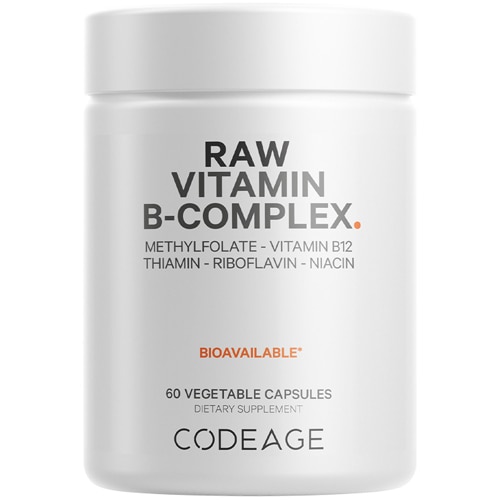[vc_row][vc_column][vc_column_text]Vitamins are
organic compounds essential for maintaining various physiological functions, including supporting cellular processes, preventing diseases and helping you stay healthy. Although the body only needs a small quantity of these vital nutrients, it cannot produce most of them in sufficient amounts. That’s why obtaining vitamins through a healthy diet or supplementation is crucial for your overall health.

In recent years, there’s been more interest in vitamin sources, particularly the distinction between raw and synthetic vitamins. Raw vitamins are obtained from natural food sources and processed in ways that seek to preserve their natural state, including the complex of enzymes, co-factors and beneficial microbes they naturally occur with.
However, synthetic vitamins are manufactured in laboratories to imitate how natural vitamins act in the body. While both forms provide the essential nutrients the body needs, there are significant
differences in their bioavailability, absorption and how the body responds to them.
Read on to learn the difference between raw and synthetic vitamins, their benefits, and why raw vitamins might be a better choice if you’re seeking natural ways to improve your health.
Understanding vitamins and their role in the body
While the body needs large quantities of nutrients like carbohydrates, proteins and fats, vitamins are required in smaller amounts. They are catalysts that facilitate various biochemical reactions in the body, thus maintaining cellular health and energy production and repairing cellular damage.
Vitamins also regulate cell growth, aid metabolism, support the immune system and promote bone health, blood clotting and cognitive function. Plenty of research studies emphasize
the role of vitamins in disease prevention and health promotion, including reducing cancer risk and improving cognitive performance. Since the body cannot produce most vitamins, except vitamin D, which is synthesized from sunlight exposure, you must obtain them through diet or supplementation.
†
What are raw vitamins?
Raw vitamins are natural and unprocessed supplements derived directly from plants or animals. They retain their natural potency and nutritional integrity and are free from artificial additives and preservatives to provide nutrients as close as possible to how you find them in nature – similar to how it processes nutrients from whole foods.
Distinction between raw and synthetic vitamins
The main differences between raw and synthetic vitamins lie in their sourcing, processing and overall nutritional content:
- Sourcing: Raw vitamins are sourced directly from whole, natural foods, including fruits, vegetables, herbs and sometimes, organically raised animal products. Synthetic vitamins are typically created in a lab from industrial chemicals and mimic the structure of naturally occurring vitamins.†
- Processing: Raw vitamins are minimally processed, so the nutrients remain in a form that is close to their original state. Techniques such as cold-pressing and freeze-drying avoid the high temperatures that can degrade the vitamins' effectiveness. Synthetic vitamins are manufactured through chemical processes that often involve high heat and solvents, which can alter their natural structure and reduce their nutritional value.†
- Nutritional Content: Raw vitamins maintain a complex of nutrients that work synergistically in the body. This includes not just the vitamins themselves but also the co-factors and enzymes that enhance their absorption and efficacy. Synthetic vitamins usually contain isolated nutrients, lacking the beneficial co-factors found in natural sources.†
Bioavailability and raw vitamins
Bioavailability refers to the proportion of a nutrient that is digested, absorbed and able to be used by the body. The theory is that raw vitamins may have higher bioavailability than many of their
synthetic counterparts since your body recognizes the natural form of these vitamins and can use them effectively. When using raw vitamins, you may improve nutrient intake in a way similar to eating whole foods, which may come with
benefits similar to adding these nutrient-containing foods to your plate.
†
Regarding raw processing, avoiding heat might prevent some vitamins from degrading and being less potent or bioavailable. This is true for the
foods you cook at home, with some vitamins and minerals being better absorbed in cooked foods while others are best kept raw or minimally heated.
Research on the difference between raw, natural and synthetic vitamins varies in outcomes, and it can depend on which vitamins are being tested.
Some research shows little difference, with natural vitamins having a slight edge, but
others show a more
significant difference.
Why choose raw vitamins?
People have become more health-conscious, and many prefer natural and holistic options, including whole-food-based raw vitamins, to get crucial nutrients in their most natural form. Choosing raw vitamins over alternatives might be ideal if you prefer organic ingredients and minimally processed products. Raw vitamins are often preferred because they may be cleaner, more natural and free from synthetic additives.
Synthetic vitamins mimic natural vitamins using raw materials like coal tar, petroleum or GMOs, making them last longer on shelves and more cost-effective (which is why they are so popular). Healthwise, the use of
synthetic vitamins is
still being studied.
Synthetic vitamins and even some heated natural ones lack the co-factors and enzymes present in raw whole foods. They may not provide the same health benefits or may
even pose risks, especially if you take multiple supplements with overlapping vitamin content.
Potential benefits of raw vitamins
Raw vitamins are natural and free from synthetic binders and fillers, often providing live enzymes and probiotics. Combining these benefits can support digestive health and absorption.
† Here are some potential benefits of choosing raw vitamins:
Live enzymes: Raw vitamins containing live enzymes help
assist digestion by breaking down food and effectively assimilating nutrients. Enzymes may help support digestive health and can potentially ease temporary bloating, constipation and indigestion. Live enzymes may also support essential bodily functions such as metabolism, energy production, DNA synthesis and detoxification.
†
Enhanced absorption: The natural, unprocessed form of raw vitamins with co-factors and enzymes might assist with the absorption of nutrients, which is especially important for tough-to-absorb nutrients like calcium and vitamin B12.
†
Live probiotics: Many raw vitamin supplements include live probiotics, which support gut health by helping to balance gut flora, which may make it easier for your body to use vitamins.
†
No binders or fillers: Raw vitamins typically do not contain synthetic binders, fillers or additives, which can be unnecessary or harmful over time, so they are a cleaner, more natural supplement option.
100% active ingredients: With raw vitamins, what you see is what you get. They are composed of 100% active ingredients, ensuring you are not ingesting anything synthetic.
†
Making the switch to raw vitamins
Incorporating raw vitamins into your diet can help you take a more natural and holistic approach to health. When looking for raw vitamins, ensure that the label clearly indicates that the product is derived entirely from natural sources with no synthetic ingredients.
Look for phrases like "100% plant-based," "whole food-based" and mentions of live enzymes and probiotics. Transparent labeling and a sign that the product is manufactured in the USA in a cGMP-certified facility are good indications of quality and potency. For instance,
Codeage’s Raw Vitamin B-Complex and
Raw Vitamin D3+ are packed with organic fruits, vegetables, enzymes and probiotics cultured in a unique raw whole food matrix to help promote their absorption and are tested for quality and purity. They are also non-GMO, dairy, soy and gluten-free.
Consult a healthcare professional before significantly changing your diet or supplement regimen, especially if you have any health conditions.
†These statements have not been approved by the Food and Drug Administration. These products are not intended to diagnose, treat, cure or prevent disease.[/vc_column_text][/vc_column][/vc_row][vc_row][vc_column][vc_text_separator title="Featured Products" border_width="2"][vc_row_inner equal_height="yes" content_placement="middle" gap="35"][vc_column_inner width="1/3"][vc_single_image image="175252" img_size="full" alignment="center" onclick="custom_link" img_link_target="_blank" css=".vc_custom_1716408027263{padding-right: 7% !important;padding-left: 7% !important;}" link="https://www.vitacost.com/codeage-raw-vitamin-b-complex-essential-b-vitamins-probiotics-enzymes-fruits-vegetables"][/vc_column_inner][vc_column_inner width="1/3"][vc_single_image image="175251" img_size="full" alignment="center" onclick="custom_link" img_link_target="_blank" css=".vc_custom_1716408045246{padding-right: 7% !important;padding-left: 7% !important;}" link="https://www.vitacost.com/codeage-raw-womens-probiotic-supplement-raw-fruits-vegetables-prebiotics-digestive-enzymes"][/vc_column_inner][vc_column_inner width="1/3"][vc_single_image image="175250" img_size="full" alignment="center" onclick="custom_link" img_link_target="_blank" css=".vc_custom_1716408076344{padding-right: 7% !important;padding-left: 7% !important;}" link="https://www.vitacost.com/codeage-raw-vitamin-d3-5000-iu-omega-9-probiotics-digestive-enzymes-raw-fruits-greens"][/vc_column_inner][/vc_row_inner][/vc_column][/vc_row]
 In recent years, there’s been more interest in vitamin sources, particularly the distinction between raw and synthetic vitamins. Raw vitamins are obtained from natural food sources and processed in ways that seek to preserve their natural state, including the complex of enzymes, co-factors and beneficial microbes they naturally occur with.
However, synthetic vitamins are manufactured in laboratories to imitate how natural vitamins act in the body. While both forms provide the essential nutrients the body needs, there are significant differences in their bioavailability, absorption and how the body responds to them.
Read on to learn the difference between raw and synthetic vitamins, their benefits, and why raw vitamins might be a better choice if you’re seeking natural ways to improve your health.
In recent years, there’s been more interest in vitamin sources, particularly the distinction between raw and synthetic vitamins. Raw vitamins are obtained from natural food sources and processed in ways that seek to preserve their natural state, including the complex of enzymes, co-factors and beneficial microbes they naturally occur with.
However, synthetic vitamins are manufactured in laboratories to imitate how natural vitamins act in the body. While both forms provide the essential nutrients the body needs, there are significant differences in their bioavailability, absorption and how the body responds to them.
Read on to learn the difference between raw and synthetic vitamins, their benefits, and why raw vitamins might be a better choice if you’re seeking natural ways to improve your health.



